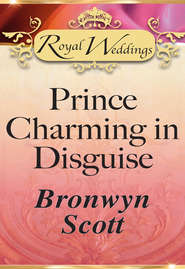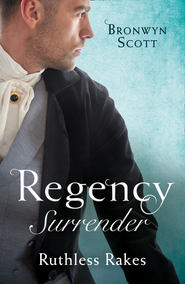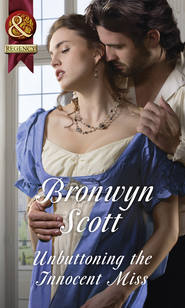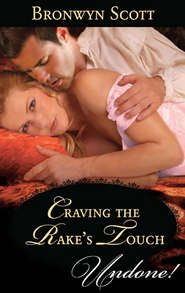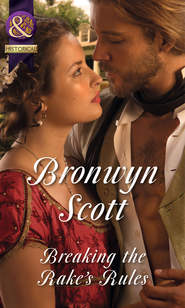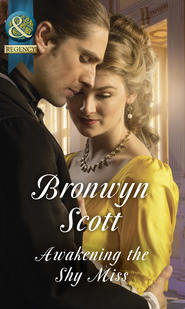По всем вопросам обращайтесь на: info@litportal.ru
(©) 2003-2024.
✖
How to Sin Successfully
Настройки чтения
Размер шрифта
Высота строк
Поля
‘No need to apologise, Miss Caulfield.’ Lord Chatham leaned back in his chair, his eyes studying her with amusement. ‘In my experience, slipping tongues can be quite entertaining.’
His remark was the final straw. She tried an arched eyebrow of her own. ‘You forget yourself, Lord Chatham. In the past hour I’ve been landed on, flirted with and flustered out of my usually solid wits. I’m starting to see why the other five governesses left.’
‘No, you’re not. You’ve barely scratched the proverbial surface.’ The good humour that floated in his eyes disappeared instantly at her remark. He rose, suddenly an icier, more distant version of himself. ‘The housekeeper will show you your rooms.’
A crash and squeal sounded overhead, followed by a child’s cry of despair. Voices were raised as maids scurried to clean up the latest disaster in what was clearly a long string of disasters of which Aunt Cressida’s vase was only a recent victim. Maura turned her eyes towards the ceiling. ‘It seems, Lord Chatham, you don’t need a governess, you need a miracle.’
He gave a cold chuckle. ‘And Mrs Pendergast sent me you. Welcome to Chatham House, Miss Caulfield.’
Chapter Two
She was late. Riordan glanced towards the mantel clock. The hands showed only a minute had passed since the last time he’d checked. He wished Miss Caulfield would hurry up. He was hungry and he was regretting his harshness with her that afternoon. She couldn’t possibly know what she’d walked into. Still, late was late. He’d been very clear when he’d sent up the invitation that he’d wished to dine at seven o’clock sharp. It was now five minutes past.
Not that he was in the habit of dining with governesses. He wasn’t. He hadn’t dined with the first five. But they hadn’t been young and pretty. Nor had they dominated his thoughts for the duration of the afternoon. They’d been dried-up old sticks who thought far too much about propriety and far too little about living. It was no wonder they hadn’t lasted. If there was one thing he knew, it was how to have fun. He was determined the children would have that, if nothing else, after all they’d been through. On those grounds, he was doing quite well in his new role as a father figure.
He’d be the first to admit he liked children. He just didn’t have a clue about how to bring them up. His brother, Elliott, had been the mature one there. It had been Elliott who’d taken on Cecilia and William four years ago after the children’s father died of a sudden fever. Now Elliott was gone, too. No one had ever imagined the children would be stuck with him and whatever help he could cobble together.
The rustle of skirts at the door told him his latest attempt at acquiring such help had arrived. ‘I apologise for being tardy. I’d expected to dine with the children. The summons was a surprise.’ This last was said with the faintest hint of frost, to suggest he wasn’t quite forgiven for his earlier harshness.
‘The invitation,’ Riordan corrected with a smile in an attempt at melting her glacial greeting. He’d expected as much, especially after his rather cold dismissal this afternoon. He hoped to make it up to her with dinner. He couldn’t afford to have another governess leave. He knew what he meant by offering dinner, but it was clear from her choice of dress she didn’t know what to make of his request. Was this work? Was this a get-to-know-you welcome sort of dinner? She’d clearly opted for the former.
She’d chosen a modestly cut gown of deep-green poplin trimmed in white lace. It was prettily done, nicely suited for tea at the squire’s or an afternoon of shopping in the village, but nowhere near fashionable enough for dinner in London with the town’s leading rogue. The simplicity of the gown and the practicality of its fabric created a stark contrast against his formal evening attire.
‘Are you going out this evening?’ Her eyes swept him briefly, likely trying to gauge the gravity of her mistake. Her mind was easy to read, not because she was transparent, but because she was not afraid to be straightforward. He’d enjoyed her boldness this afternoon even if it had ended on a sour note.
‘Yes, but nothing that demands my attendance with any scheduled rigour. I am free to arrive when I choose.’ Going out had lost much of its allure in the month since his brother’s death. Three months of mourning was the standard for a sibling if the sibling had managed to die conventionally. Elliott had not. As a result, London was happy to let Riordan proceed as usual with his customary social routine after a two-week hiatus to fetch the children from Chatham Court.
Riordan suspected such benevolence had more to do with society’s greed for gossip. If he was left rusticating for three months in grief, there’d be considerably fewer rumours for the scandalmongers to spread regarding his brother’s demise and the Season would be that much duller for it.
The butler announced dinner and he offered Miss Caulfield his arm, secretly pleased she was as discomfited with his show of propriety as she’d been with his earlier impropriety.
‘Such formality,’ she commented, taking the chair Riordan held out for her at the table. ‘I apologise for being under-dressed. I wasn’t sure …’ Her voice trailed off and Riordan imagined her upstairs in her room debating the merits of the green poplin or the one good silk gown she owned. ‘You were right to save the silk for a better occasion,’ he said lightly, taking his own seat.
‘How did you know?’ She shot him a sharp look, her thoughts evident. He’d bet odds of two to three she was imagining peepholes secreted in the walls of her room. It was a fairly worldly thought for a governess, or any young lady, and it did make him wonder.
Riordan dismissed her fears with a laugh. ‘Have no worries, Miss Caulfield. It’s all very simple. To understand women, a man must understand their clothes.’ He’d learned that particular skill a long time ago and it had served him well in the intervening years.
She settled the linen napkin on her lap and gave him a doubtful look that said she didn’t believe him. Riordan leaned back in his chair, letting the footmen serve the soup while he studied the effects of candlelight on Miss Caulfield’s features. This morning, much of her hair had been hidden under her bonnet, but this evening it was pinned up in a pretty twist that hinted at its thickness and length while it exposed the delicate arch of her neck. The effect was enough to make him imagine what it would be like to take all that hair down and sift it through his fingers. ‘The light turns your hair into red-gold; very lovely,’ he commented as the footmen moved away.
‘And what does that tell you about me?’ She shot him another sharp look with her green eyes.
‘You don’t believe me about the clothes, do you?’ Riordan set down his soup spoon, starting to enjoy himself. He was good at this. Observation and subsequent conjecturing had always come easy for him. Most women loved his little ‘fortune telling’ game. ‘Allow me to demonstrate. You wear shades of green often. With your colouring, all that red hair and those emerald-green eyes, it makes sense. Greens would be your best palate. I’m right, am I not?’
‘Yes.’ Even discomfited, her manners were impeccable. She sipped from her soup spoon without spilling a drop. His governess was very well bred indeed.
‘You’re intrigued now. I can see it in the way you’ve subtly leaned forwards.’ Riordan lowered his voice, giving the conversation a private allure.
Her eyes sparked, a good sign. She was warming. ‘All right, if you’re so good, tell me why a governess has a silk gown.’ But any further conversation had to wait a moment while the fish was served.
‘You have more than one,’ Riordan said when the footmen had retreated. He wasn’t sure how he knew that, but it seemed right. She was born for fine fabrics and delicate trimmings. Riordan reached for her hand and traced a lazy circle in the palm. ‘Tell me I’m right.’ A woman who wore silk gowns and imagined peepholes in her room was an exciting mystery. ‘You’re not the usual governess.’
She stiffened and withdrew her hand. ‘You’re not the usual earl.’ All her attention went straight to her neglected fish. He’d touched a nerve there. Intriguing, but not surprising. Her clothes were too well made. He’d seen it instantly. Pretty and young with well-made clothes and a bold demeanour with a man she should view as her superior suggested there was more to Miss Caulfield than she let on.
‘I don’t hold it against you, Miss Caulfield. The “usual” has never held much of my attention.’ He would leave it at that. No sense frightening her off. If she thought he guessed at more, she might be compelled to run and that was the last thing he needed. He needed a governess to stay and he was willing to overlook any secrets said governess thought she had.
Miss Caulfield finished her fish without a single faux pas. He always watched women during the fish course at dinner parties. It was the perfect chance to see if they were all they claimed. Miss Caufield was definitely more. Unlike many a pretender, she’d kept a piece of bread in her left hand and the fork in her right, never once reaching for the very taboo knife. Anyone of any true social refinement knew fish juice stained knives if they weren’t silver. It confirmed what he’d noted earlier: she had excellent table manners, as if she ate at candlelit tables complete with china, crystal and the requisite earl every day.
By the time the beef was served, his thoughts had taken a more erotic turn. He found he could not contemplate her manners without also contemplating her delectable mouth with its kissable lower lip, or the column of her throat as she swallowed. This led his eyes lower to her bosom, which the cut of her gown showed to advantage, which gave way to a bevy of illicit thoughts, most of them involving all the ways he could get her out of that gown and on to the table.
‘Is everything to your liking?’ he asked in low tones that were more seductive than solicitous. ‘Would you like some more wine?’ He was flirting deliberately now, his hand provocatively caressing the stem of his own empty wine glass, and wondering if she’d call him on it. She did. It was bravely and boldly done of her. Not every employee would dare. Good for her. He had little use for people without spines.
‘Tell me, Lord Chatham, do you flirt with every woman you meet or just the governesses?’
Riordan reached for the wine and refilled her glass as an excuse to lean close and make some more mischief. ‘I assure you, this is not flirting. If I were flirting with you, Miss Caulfield, you’d know it.’ But of course he was flirting with her, just a little by his standards, and they both knew it.
Riordan laughed and filled his glass. ‘A toast, Miss Caulfield, to our, ah, relationship. Cheers.’
Maura clinked her glass gently against his. It was impossible not to get swept up in Lord Chatham’s bonhomie. He couldn’t help it, she realised. But she could. She could have enough sense for the both of them. He might not be flirting with her by his standards, but society would see it otherwise. No wonder Mrs Pendergast had called him a dissolute rake. Women probably swooned in his wake and he likely didn’t lack for female attention. Handsome, charming and personable, he could have any woman he wanted and not have to work that hard at it.
Well, he couldn’t have her if that’s what he was intending with all this light flirtation. She would make that clear over cheese and fruit as their dinner came to a close. It would be just the right note to end the evening on. Two bites into a sharp cheddar, she began her campaign. ‘I thought the purpose of dinner was to discuss the children. Here we are, at the end, and the children haven’t even been mentioned.’ She couldn’t be more direct than that.
‘What would you like to know about the children?’ He filled his glass again and Maura began to wonder if that was his third or fourth. Wine disappeared from his glass like water.
‘We could start with their schedule and perhaps move on to their education,’ Maura prompted. This was the most extraordinary discussion she’d ever had. She wasn’t supposed to be the one asking the questions. She’d expected to be told.
‘Their schedule?’ Lord Chatham stabbed at his cheese as if the question irritated him. His tone became frosty, as it had been that afternoon. ‘They don’t have a schedule, Miss Caulfield. Their lives have been turned upside down, they’ve lost their trusted guardian, they’ve been through five governesses in as many weeks. They’ve had no stability in their lives since my brother’s death.’
Maura refused to be intimidated. ‘They’ve had you. Surely you have imposed some order on their lives in the absence of a governess.’ Her own parents had been active participants in her life.
‘Some, but I wouldn’t go as far as to call it a schedule.’ Lord Chatham sat back in his chair, wine glass empty again and dangling negligently in his hand. ‘I can see you’re disappointed in me. Perhaps your standards are too high.’ He wasn’t flirting now. His tone had taken on a self-deprecating note. ‘Don’t forget, I’m a bachelor with bachelor ways. If I knew how to raise children, you wouldn’t be here.’
He set down the wine glass and rose. ‘If you’ll excuse me, the hour is later than I anticipated and my presence is required elsewhere, as tardy as it is. Feel free to partake of the cheese and fruit without me.’ He offered a short bow and left. It was quite possibly the most expedient exit she’d ever witnessed and most definitely one of the rudest.
His bachelor ways indeed! Maura fumed up in her room afterwards. Everything he did, everything he said, reminded her of his ‘bachelor ways’. Even his departure from the dinner table had reeked of them. Apparently he was expected at the Rutherfords’ ball and the Duke of Rutland’s fête before meeting up with some fellows at a gambling hell on St James’s. He wouldn’t be back until early morning.
It had been on the tip of her tongue to reprimand him for his less-than-fatherly behaviour, but she’d already angered him once today and she knew he wasn’t the only man who habitually spent the night on the town while leaving his children in the hands of others. That didn’t make it right. Maura didn’t hold with the laissez-faire parenting of the aristocracy. Her own upbringing had run quite counter to the norm and for that she would always be grateful.
She’d also be grateful for her bed. Maura began taking down her hair and stowing the pins carefully in a little trifle box on her bureau. It had been an eventful day and she was beyond tired. She smiled to herself as she went through her evening toilette. Maura pulled a white nightgown over her head and surveyed her room. It was smaller than what she was used to, but it was a nice room on the third floor. There was a window overlooking the garden and it was hung with fresh curtains. The walls were papered with a tiny pink-floral print and the bed was covered in a pink-and-white counterpane. A clothes-press stood in one corner and a small chest of drawers in another. It would do, and after three days on the mail coach it seemed like heaven.
She might not be living the life she’d been born to, but she’d done well today. She’d got a position, navigated the streets of London and met the intriguing Earl of Chatham. Not bad for a gently bred girl from Devonshire. But she would need to tread carefully. The earl might flirt, he might raise his wards with the same benign insouciance with which he lived his life, but that didn’t mean he didn’t see far more than he let on.
The perceptive Lord Chatham had implied correctly that she wasn’t the usual governess. She hadn’t meant to give herself away and yet she had in ways she couldn’t control. Hopefully he had guessed nothing more and was not interested in guessing anything more. As long as she did her job with his wards, she hoped he would look no further. The last thing she needed was for someone to get too curious about her origins.
Maura hopped into bed, revelling in the cool sheets and the fluffy pillow at her head. That was one thing Lord Chatham might have in common with her; she wasn’t the only one with secrets. That was all right with her. He could have his secrets as long as she could have hers.
It had not escaped her notice when she’d stepped down from the mail coach that morning that it was to have been her wedding day. If she’d stayed in Devonshire, she’d have been married to Wildeham by now and subjected to a lifetime of his obscene attentions, a fate certainly worse than throwing in her lot with the Earl of Chatham.
Maura blew out the candle beside her bed and whispered in the darkness, ‘A toast, Lord Chatham. Here’s to our, ah, relationship. Cheers.’






